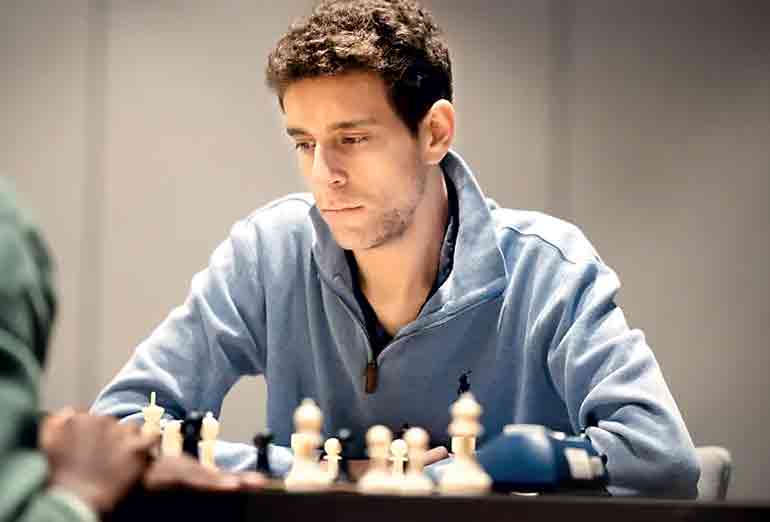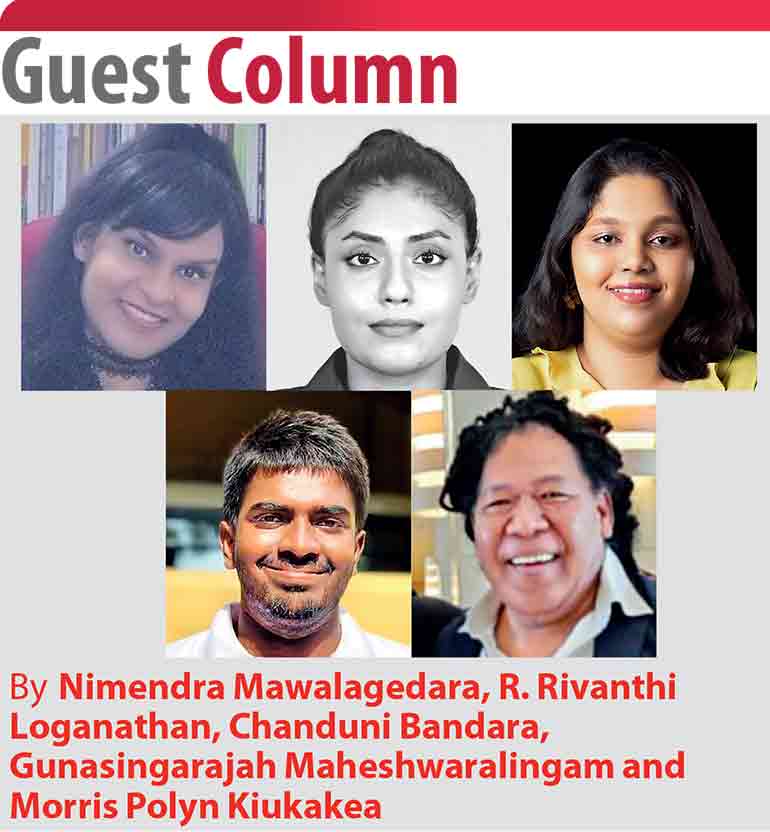Friday Feb 20, 2026
Friday Feb 20, 2026
Tuesday, 11 November 2025 00:01 - - {{hitsCtrl.values.hits}}

American chess grandmaster Daniel Naroditsky
The discussions following the sudden death of chess grandmaster and international chess commentator Daniel Naroditsky have initiated a dialogue on online conduct, cyberbullying, responsibility, and the conditions under which people choose either to speak or remain silent.
We do not claim to know the full circumstances of his death, nor do we suggest that any single factor can explain a loss of this magnitude. The point is not to determine causality, but to examine what the responses to his death reveal about the environments in which many people now live, study, and work. We write here as individuals who have seen similar patterns unfold in academic communities and online spaces, often without clear means of intervention.
Since his passing, many observers have spoken about the pressure Naroditsky faced on online platforms, including relentless, unfounded accusations of cheating and sustained speculation. However, these patterns were visible long before his tragic death. They were noted, partially discussed, and largely allowed to continue. Some in the chess community reportedly reached out in solidarity in private. However, in public, no individual or organisation was willing to stand clearly and unwaveringly in his defense.
This is not unique to chess. The same dynamics appear in universities, workplaces, and online platforms. In this digital age, the risk is even greater. Social media and AI amplify both the scale and speed of such harassment and bullying. They enable both prominent public figures and anonymous users to deliver continuous personal attacks under the guise of accountability and “brutal honesty,” while disregarding that there are real human beings at the receiving end of that sustained scrutiny. People often recognise when someone is being bullied or harassed, yet they hesitate to intervene. They advocate resilience rather than pursuing accountability. They speak about kindness in principle while calculating the personal and professional cost of involvement.

On principle, we can all agree that when bullying occurs, bystanders should speak up. Although this expectation appears morally clear, it does not address the real risks attached to intervention. This is especially true if such an intervention must be made in public or within a hierarchical social structure. In such cases, speaking up can lead to reputational damage, strained relationships, and social exclusion. Research in psychology and sociology repeatedly shows that individuals are less likely to act when the costs of action are unevenly distributed. Some individuals possess security to absorb those costs, whether through status, institutional protection, or established networks. Others do not.
Expressions of sympathy and calls for justice
In this context, expressions of sympathy and calls for justice that followed Naroditsky’s tragic death should not be dismissed as insincere or opportunistic. They reflect the fear and uncertainty that structure many public and social spaces. The question is not why individuals did not speak earlier on Naroditsky’s behalf. The question is why silence often appears to be the most rational response. That question rarely gets the attention it deserves, since it shifts the blame from individuals to the underlying systems that shape our choices. Recognising this is uncomfortable because systems are harder to challenge than individuals.
This issue is particularly relevant in educational settings. Universities encourage students and early-career scholars to communicate openly and seek support. Yet the cultural expectations of many academic environments reward composure, emotional restraint, and the ability to manage pressure without visible struggle. Students and junior colleagues observe how vulnerability is judged, who becomes isolated after expressing difficulty, and who is quietly penalised for disrupting established hierarchies. They learn that silence can feel safer than disclosure.
As a result, we are moving towards a global culture that celebrates “toughening up.” Thus, anything related to mental health is classified as an indulgence that one must handle on one’s own. Through these social structures and expectations, we are taught that feeling sad, overwhelmed, tired, or depressed is a choice, and therefore is a sign of weakness. At the same time, we are encouraged to normalise these feelings and push through them, with the expectation that such endurance will be rewarded, whether with career advancement, higher pay, or societal praise. Enduring in silence becomes a sign of being a “hard worker” and is often valued above seeking help.
This dynamic plays out in the chess world, where public discussions sometimes compare how Hans Niemann and Naroditsky responded to intense scrutiny and online abuse. They frame silent endurance as a virtue, while the character of those who struggle is implicitly judged. This logic is harmful, as it shifts the focus from the system to the individual. It turns one person’s suffering into a benchmark for endurance. Such valorisation is unfair to those who are held up as examples and to those who are judged for struggling. What is truly needed is recognition of the harm that they both endured and action that prevents anyone from being subjected to such treatment. Instead, the conversation continues to move away from the need to address bullying toward a harmful measure of individual toughness.
These pressures are amplified by contradictory cultural messages. Younger generations increasingly discuss mental health openly, yet they simultaneously encounter toxic influencer culture that monetises “mental toughness” and relentless productivity. At the same time, older generations and established institutions interpret such openness as evidence of fragility or a declining work ethic. The result is a detrimental clash between emerging norms and the longstanding expectation that you must “toughen up and keep moving.”
Unhealthy levels of isolation and emotional endurance
These pressures are intensified in settings where deference and reputation operate as governing norms. In many South Asian universities, for instance, seniority and institutional loyalty influence what individuals believe they can express. Yet the underlying logic is not regional. In any environment where advancement depends on reputation and networks, silence becomes a strategy of self-preservation. People do not remain silent because they lack courage, but because the environment has made courage costly.
The chess world provides a relevant comparison. It is a community defined by high intelligence, emotional regulation, competitive pressure, and strict discipline. If a community of individuals with such focus and achievement-oriented identities struggled to respond to visible strain, academic and professional institutions should take notice. The issue is not whether competition and challenges are inherently harmful or whether online platforms are dangerous. It is whether unhealthy levels of isolation and emotional endurance have become normalised as conditions for belonging.
Responses that emphasise empathy, awareness, or mental health support are necessary, but they address symptoms rather than structure. The deeper issue is the normalisation of harshness across many online and professional environments. This is often rooted in a distorted view of power built on the same logic that frames personal attacks as “brutal honesty” or “tough love” and justifies them as necessary preparation for the real world. However, when such harshness is treated as an ordinary feature of participation, silence becomes a reasonable adaptation. When silence becomes routine, it is not just a response to harshness, but a lesson passed down from veteran to novice. Newcomers quickly learn that quiet endurance is expected if they want to belong or advance. As a result, harm becomes visible only in retrospect, often when there is very little that can be done.
Responses that emphasise empathy, awareness, or mental health support are necessary, but they address symptoms rather than structure. The deeper issue is the normalisation of harshness across many online and professional environments. This is often rooted in a distorted view of power built on the same logic that frames personal attacks as “brutal honesty” or “tough love” and justifies them as necessary preparation for the real world. However, when such harshness is treated as an ordinary feature of participation, silence becomes a reasonable adaptation. When silence becomes routine, it is not just a response to harshness, but a lesson passed down from veteran to novice
Responsibility here is collective. Individuals in positions of authority, whether lecturers, advisors, supervisors, or senior colleagues, can alter the perceived cost of reaching out. This does not require intensive intervention or emotional interactions. It requires that we are consistent. It requires us to listen before a tragedy. It requires us to send a clear signal that acknowledgment of difficulty will not result in informal penalties. Finally, it also requires us to establish a clear distinction between legitimate critique and personal degradation and be willing to intervene when that boundary is crossed.
No community can eliminate conflict, stress, or psychological strain. But communities can shape whether individuals believe that seeking support is an acceptable and viable action. They can influence whether silence feels optional or compulsory. They can determine whether support is accessible before crisis rather than after.
What happened to Daniel Naroditsky cannot be undone. But the structures that make silence appear rational are not set in stone. They are outcomes of norms, expectations, and institutional design. Therefore, they can and should be changed. Doing so does not require eliminating disagreement or debate. It requires recognising that the environments we create shape what people perceive as possible, and that silence is often a signal of an environmental flaw rather than a personal failing. The distance between suffering and support is not inevitable. It was created by us; therefore, we can choose to reduce that distance.
(Nimendra Mawalagedara, PhD, is a visiting lecturer who specialises in International Relations and Comparative Politics. R. Rivanthi Loganathan, Independent Researcher Chanduni Bandara is a junior researcher at a Colombo-based think tank. Gunasingarajah Maheshwaralingam, a temporary instructor in English, University of Peradeniya Morris Polyn Kiukakea, BA, PDG Applied Social Theory, PDG Politics and Governance. )